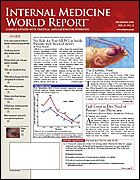Publication
Article
Internal Medicine World Report
Why Red, Not White, Wine Protects Against Colon Cancer; Screen Smokers Earlier
Author(s):
From the American College of Gastroenterology Resveratrol Holds Promise in Obesity-Related Diseases
LAS VEGAS—It has long been suggested that dietary factors can influence the risk of colorectal neoplasia. Now one of these factors—red wine consumption—has been found to be protective.
Joseph C. Anderson, MD, who conducted a series of studies on lifestyle factors and colorectal cancer risk, presented his findings at the American College of Gastroenterology annual meeting.
In one study, he and his colleagues examined the effects of red and white wine on colorectal cancer risk in asymptomatic persons older than 40 years who underwent colorectal cancer screening.
They compared findings on a screening colonoscopy in 1381 abstainers, 176 persons who drank ≥3 glasses of red wine each week, and 68 who drank ≥3 glasses of white wine each week. Variables controlled for were age, gender, body mass index (BMI), smoking, alcohol consumption, medications, red meat consumption, use of aspirin and other nonsteroidal antiinflammatory drugs, and fruit/vegetable consumption.
P
“Red wine dramatically reduced the risk of colorectal neoplasia by 68% ( = .023), but white wine did not,” said Dr Anderson, of Stony Brook University, New York City.
He suspects that the high content of resveratrol in red wine may be responsible for this protective effect. “The concentration is significantly higher in red wine than in white wine, because the skins are removed earlier during white wine production,” Dr Anderson said.
Nature
Shortly after the conclusion of the meeting, a study that appeared in (2006 Nov 1) reported that resveratrol improved motor function, increased insulin sensitivity, and reduced insulinlike growth factor in mice fed high-calorie diets. The authors concluded that resveratrol held promise as a treatment for obesity-related diseases and diseases of aging.
In this study, mice that became obese on high-calorie diets had shorter life-spans than control mice. But obese mice that were also fed resveratrol had 30% longer lifespans than obese mice not given resveratrol. Compared with the thinner control mice, the resveratrol-fed obese mice had similar-looking hearts and livers and comparable everyday functioning.
Dr Anderson presented other data at the meeting indicating that women who smoke or are obese should undergo colorectal cancer screening earlier than average-risk individuals.
He conducted a multivariate analysis in asymptomatic women older than 40 years who presented for screening colonoscopy. The women were divided into 3 groups: (1) current smokers or those who smoked >10 pack-years, (2) those who smoked <10 pack-years or who had quit smoking more than 10 years ago, and (3) never smokers.
Results showed that:
• Current smokers had a 2.15 times greater risk of significant colorectal neoplasia compared with never smokers
• Women with a BMI >35 mg/kg2 had 2.23 times the risk compared with those with a BMI <35 mg/kg2
• A family history of colorectal cancer doubled the risk of colorectal cancer compared with no family history.
In looking specifically at 2536 study participants of either gender who were 40 to 50 years old, smokers had more than double the prevalence of significant colorectal neoplasia than never smokers or low-exposure smokers (12.2% vs 5.5%; P = .03), corresponding to a 2.38-fold increased risk.






